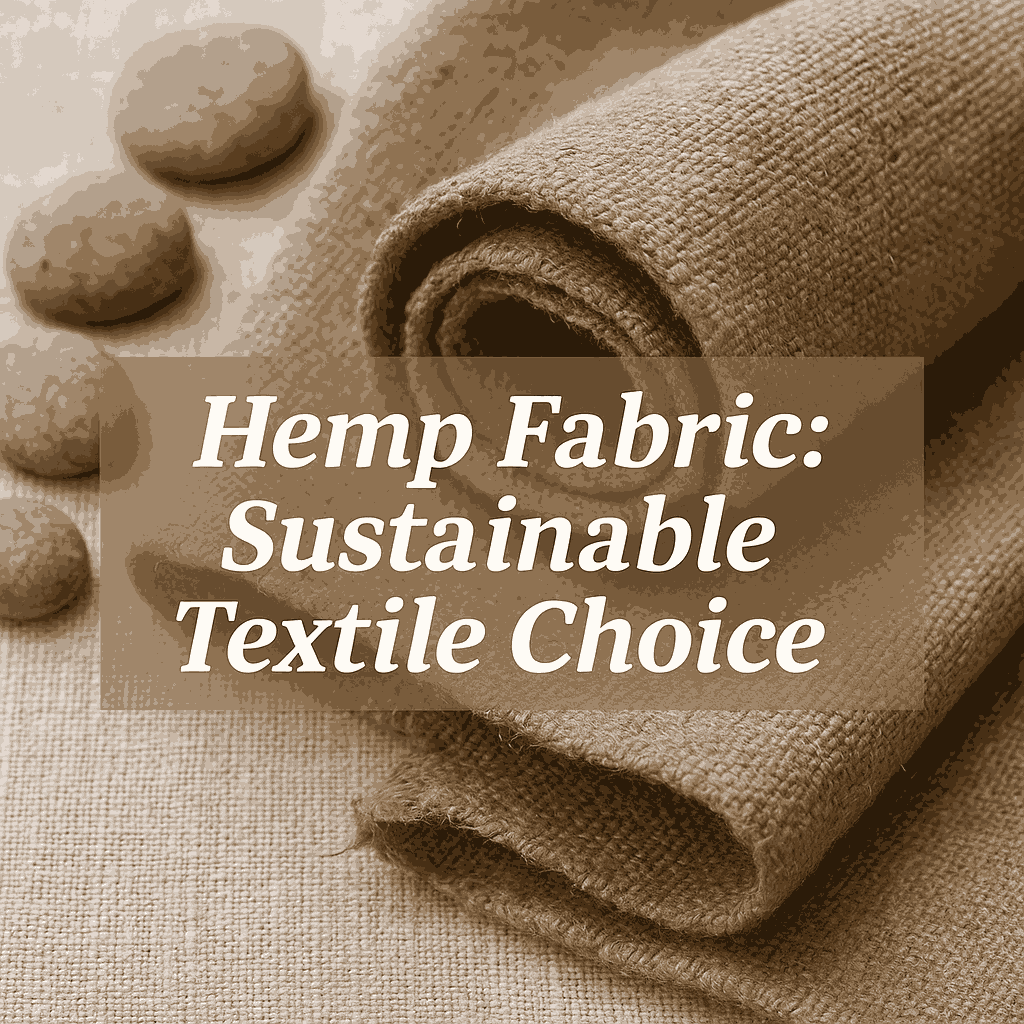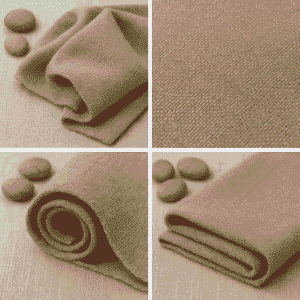- Home
- About
- Products
Single Fill Duck
Army Duck Fabric
Numbered Duck
- 200 GSM Cotton Polyester Mix Canvas Fabric
- 220 GSM Cotton Polyester Mix Canvas Fabric
- 290 GSM Cotton Polyester Mix Canvas Fabric
- 295 GSM Cotton Polyester Mix Canvas Fabric
- 315 GSM Cotton Polyester Mix Canvas Fabric
- 375 GSM Cotton Polyester Mix Canvas Fabric
- 390 GSM Cotton Polyester Mix Canvas Fabric
- 470 GSM Cotton Polyester Mix Canvas Fabric
- Eco Weav
- Re Weav
- Certificates
- Contact Us
What is Hemp Fabric? A Complete Guide to Properties, Uses & Manufacturing in India

Sustainability has become more than just a trend in the textile industry—it’s a necessity. Among the eco-friendly fabrics making a global impact, hemp fabric stands out for its versatility, strength, and environmental benefits. From clothing to home textiles, this natural material is fast becoming a favourite among designers, manufacturers, and eco-conscious consumers alike.
At Radhey Krishna Cotweaving, a trusted hemp fabric manufacturer in India, we specialise in weaving high-quality hemp and hemp-blend fabrics that meet international standards. In this blog, we’ll explore what is hemp fabric, dive into hemp fabric properties, and explain why it is considered the fabric of the future.
What is Hemp Fabric?
Hemp fabric is a natural textile made from the stalk fibres of the hemp plant (Cannabis sativa). Unlike synthetic fabrics that rely on petroleum-based processes, hemp is entirely plant-derived, making it one of the oldest and most sustainable textiles known to mankind.
Historically, hemp has been used for centuries in civilisations across Asia, Europe, and the Americas. Its fibres are long, strong, and highly durable, which is why hemp was once widely used to make ropes, sails, and uniforms. Today, it is being rediscovered as a green alternative to conventional fabrics like cotton and polyester.
But what makes hemp fabric truly remarkable is its sustainability profile. Hemp plants require significantly less water than cotton, grow quickly without pesticides, and actually improve soil health through a process called phytoremediation. This makes hemp fabric one of the most eco-friendly choices available in modern textiles.
At Radhey Krishna Cotweaving, we produce a 40% hemp and 60% cotton blend, balancing hemp’s strength with cotton’s softness. The blend offers a GSM range of 130–200 and fabric widths between 48–71 inches, ensuring versatility for various applications. Customers can also choose blends with GOTS-certified organic cotton for added sustainability and certification assurance.
Hemp Fabric Properties
The growing demand for hemp fabric isn’t just about its eco-friendly reputation—it’s also about its outstanding performance characteristics. Let’s explore the key hemp fabric properties that set it apart:
- Strength and Durability: Hemp is known as one of the strongest natural fibres. Its tensile strength is significantly higher than cotton, making hemp-blend fabrics resistant to wear and tear. This durability ensures that garments and textiles made from hemp last longer, reducing the frequency of replacement and contributing to sustainable consumption.
- Breathability and Moisture-Wicking: Hemp fabric is naturally breathable, allowing air to circulate easily. It also has excellent moisture-wicking properties, which means it absorbs sweat and releases it quickly, keeping the wearer cool and dry. This makes hemp an ideal fabric for warm climates like India and for activewear applications.
- Anti-Bacterial and Hypoallergenic: One of the most unique hemp fabric properties is its natural resistance to bacteria, mould, and mildew. Hemp fibres contain inherent antimicrobial qualities, which prevent odours and make the fabric safe for sensitive skin. Its hypoallergenic nature makes it a preferred choice for people prone to skin irritations.
- Thermal Regulation: Hemp fabric adapts well to different temperatures. It keeps the wearer warm in cooler conditions and cool in warmer weather. This thermal adaptability adds to its comfort and makes it suitable for year-round use.
- Sustainability and Eco-Friendliness: Hemp requires minimal water, grows without chemical fertilisers or pesticides, and yields a higher fibre output per acre compared to cotton. Additionally, hemp plants absorb large amounts of carbon dioxide, making them climate-friendly. When combined with organic cotton, as we do at Radhey Krishna Cotweaving, the sustainability factor multiplies.
- Softness and Comfort: Although hemp is often associated with rough textures, modern processing techniques and blending with cotton result in a fabric that is soft, breathable, and highly wearable. Over time, hemp fabric becomes even softer with each wash without losing its strength.
In summary, hemp fabric is not only durable and eco-conscious but also delivers superior comfort, making it an exceptional choice for apparel, upholstery, and industrial textiles alike.
Hemp-Cotton Blend: The Perfect Combination
At Radhey Krishna Cotweaving, we manufacture a 40% hemp and 60% cotton blend that balances the sturdiness of hemp with the comfort of cotton. The GSM range of 130–200 provides flexibility for various fabric weights, while widths from 48 to 71 inches cater to both apparel and home textile applications.
Customers can opt for blends with conventional cotton or GOTS-certified organic cotton, ensuring that both affordability and sustainability needs are met. This blend is ideal for eco-conscious fashion brands and manufacturers seeking fabrics that combine comfort, durability, and traceability.
Packaging & Quality Assurance
We understand that global buyers value both convenience and quality. That’s why we offer two packaging options:
- Roll Packing: Up to 500 meters per roll, vacuum-sealed to ensure protection.
- Bale Packing: Compact and efficient for large-scale shipping.
All fabrics come with GOTS certification,OCS 100, OCS Blended, validating the organic cotton content and assuring buyers of ethical and sustainable practices. Additionally, our complete traceability system ensures transparency in every order.
Why Choose Radhey Krishna Cotweaving for Hemp Fabric?

As a family-owned manufacturer from Kishangarh, Rajasthan, Radhey Krishna Cotweaving has earned a reputation for delivering high-quality fabrics at competitive prices. With a workforce of over 150 skilled employees, we specialise in weaving hemp blends that meet American, Australian, British, and other international standards.
Our commitment lies in producing fabrics that combine sustainability, durability, and affordability. From roll-to-roll inspection to compliance with the American 4-Point System, we ensure every meter of fabric meets stringent quality benchmarks.
Applications of Hemp Fabric
Hemp fabric’s versatility makes it suitable for multiple industries:
- Fashion Apparel: Shirts, trousers, dresses, jackets, and casual wear.
- Home Textiles: Curtains, upholstery, table linens, and bedding.
- Eco-Lifestyle Products: Tote bags, backpacks, and accessories.
- Industrial Uses: Canvas, ropes, and heavy-duty textiles.
This broad spectrum of applications highlights hemp’s potential as a future-ready fabric.
The Future of Hemp Fabric in the Textile Industry
As sustainability becomes central to global textile demand, hemp fabric is expected to play a transformative role. Fashion brands and manufacturers are increasingly turning to hemp due to its eco-friendly reputation and performance benefits. With government support and consumer awareness rising, hemp is poised to become a mainstream fabric in both domestic and international markets.
Final Thoughts
Hemp fabric is more than just a trend—it’s a textile revolution. With its durability, comfort, and eco-friendly attributes, it addresses both consumer needs and environmental concerns. By choosing hemp, businesses and individuals contribute to a greener future.
At Radhey Krishna Cotweaving, we are proud to be at the forefront of this movement as a reliable hemp fabric manufacturer in India. Our blends, certifications, and dedication to quality make us a trusted partner for global buyers.
Looking for high-quality hemp fabric blends? Contact us today and source sustainable fabrics at the best prices.
FAQs
What is hemp fabric used for
Hemp fabric is widely used in clothing, home textiles, eco-friendly bags, and industrial products like canvas and ropes. Its durability, breathability, and sustainability make it a versatile choice across fashion and lifestyle industries.
Is hemp fabric eco-friendly?
Yes, hemp fabric is highly eco-friendly. The hemp plant requires little water, no pesticides, and improves soil health. It also absorbs carbon dioxide, making hemp a sustainable alternative to cotton and synthetic fabrics.
What are the main properties of hemp fabric?
Hemp fabric is durable, breathable, moisture-wicking, antibacterial, and hypoallergenic. It regulates temperature effectively, keeping wearers cool in summer and warm in winter. Modern blends with cotton enhance its softness and comfort.
How does hemp fabric compare to cotton?
Hemp fabric is stronger, more durable, and more eco-friendly than cotton. While cotton is softer initially, hemp blends provide comfort with longer-lasting performance, making them an ideal sustainable fabric choice for apparel and home textiles.
Does hemp fabric shrink after washing?
Like cotton, hemp fabric may shrink slightly during the first wash. However, once pre-shrunk or blended with cotton, it maintains its size and shape well, becoming softer and more comfortable with each wash.
Is hemp fabric certified organic?
Hemp itself is naturally sustainable, and when blended with GOTS-certified organic cotton, as offered by Radhey Krishna Cotweaving, it meets strict international standards for organic textiles, ensuring authenticity and eco-friendly production.
Who is the leading hemp fabric manufacturer in India
Radhey Krishna Cotweaving, based in Kishangarh, Rajasthan, is a trusted hemp fabric manufacturer in India. They specialise in hemp-cotton blends, offer GOTS certification, and provide global buyers with sustainable, high-quality fabrics.

